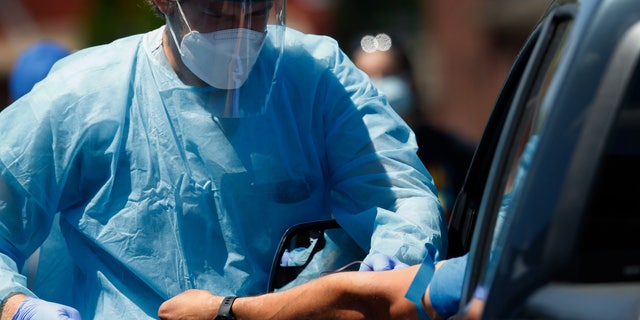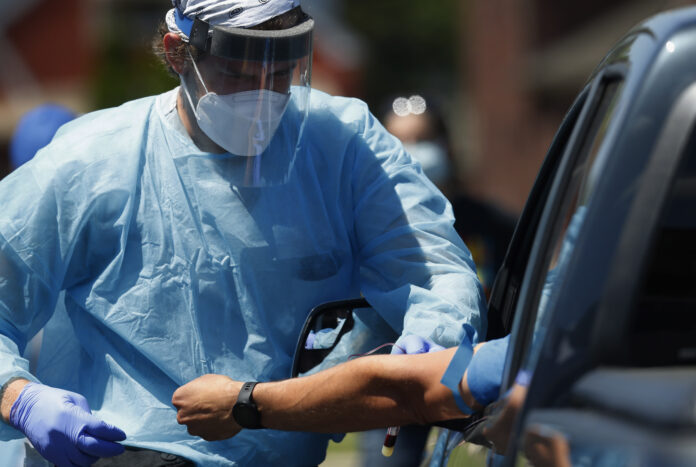A team of scientists conducting a genetic analysis of coronavirus patients found that having a certain blood type may impact the risk you have of developing the illness, according to a study on Wednesday.
The study, which appeared in the New England Journal of Medicine, compared the genes of thousands of European patients and found those with Type A blood were more likely to come down with severe illness. Those with Type O blood were less likely.
ONE BLOOD TYPE MAY PROVIDE SOME CORONAVIRUS PROTECTION, STUDY SUGGESTS

A health worker draws blood for COVID-19 antibody testing in Dearborn, Mich on June 12, 2020. A genetic analysis of COVID-19 patients published Wednesday the New England Journal of Medicine suggests a person’s blood type may have some influence on whether they develop severe disease. (AP Photo/Paul Sancya, File)
The research comes after a similar study out of China published in March found that those with Type O blood may be more resistant to SARS-CoV-2 — the virus that causes COVID-19 — while those with Type A blood might be more at risk.
“Most of us discounted it because it was a very crude study,” Dr. Parameswar Hari, a blood specialist at the Medical College of Wisconsin, said of China report. Following the new study, he declared “now I believe it,” adding “it could be very important.”
The recent study, which consisted of scientists in Italy, Spain, Denmark, Germany, and other countries, compared 1,980 patients with severe COVID-19 to several thousand other people who were otherwise healthy or had only mild or no symptoms. Researchers tied variations in six genes to the likelihood of severe illness, while also tying blood groups to potential risk.
Hari said that people with Type O are better at recognizing certain proteins as foreign, which may extend to proteins on virus surfaces. During the SARS outbreak — essentially a genetic cousin of the novel coronavirus — “it was noted that people with O blood type were less likely to get severe disease,” he added.
OREGON CORONAVIRUS RULE CALLS FOR FACE MASKS IN 7 COUNTIES BEGINNING NEXT WEEK
Critics did urge caution due to certain factors, including how a limited number of patients were featured in the most recent study.
In comparison, the genetic testing firm 23andMe released a study that featured 750,000 participants earlier this month after the company used its testing services to help scientists better understand how genetics may play a role in why some people who contract the novel coronavirus develop various levels of severity and symptoms.
Still, the larger study did find that Type O blood was between 9 and 18 percent less likely to test positive for COVID-19 when compared to the other blood types, which echoed the most recent European study.
There are four main blood types — A, B, AB and O — and “it’s determined by proteins on the surface of your red blood cells,” said Dr. Mary Horowitz, scientific chief at the Center for International Blood and Marrow Transplant Research.
Blood type also has been tied to susceptibility to some other infectious diseases, including cholera, recurrent urinary tract infections from E. coli, and a bug called H. pylori that can cause ulcers and stomach cancer, said Dr. David Valle, director of the Institute of Genetic Medicine at Johns Hopkins University.
CLICK HERE FOR FULL CORONAVIRUS COVERAGE
Bottom line: “It’s a provocative study. It’s in my view well worth publishing and getting out there,” but it needs verification in more patients, Valle said.
Fox News’ Madeline Farber and the Associated Press contributed to this report






